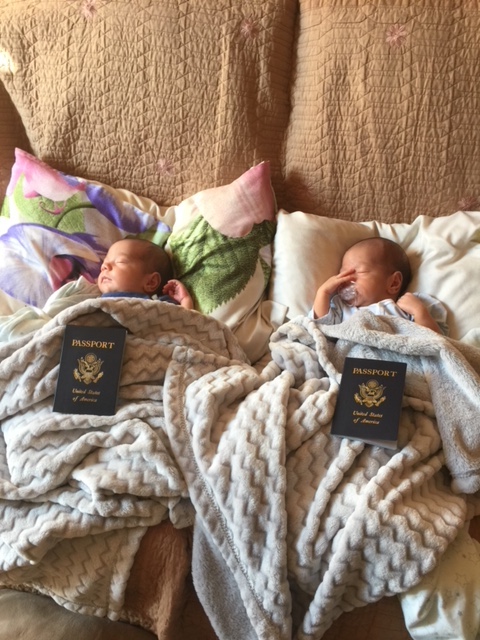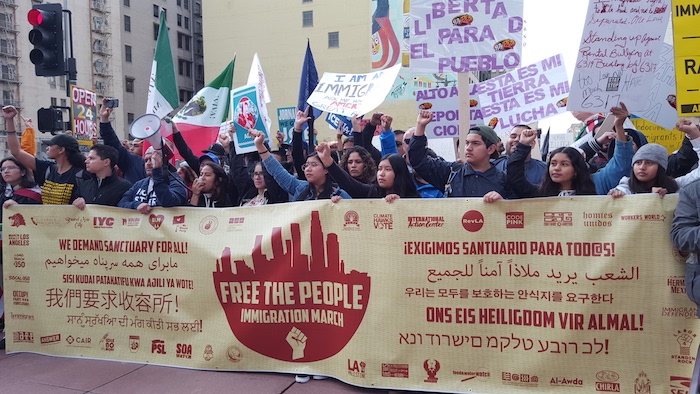Magazine, The Immigrant Experience, Byline By Jay Nault
Why do people decide to leave their home countries to live somewhere else? There are many reasons for such a monumental decision, but most immigrants will tell you that they are looking for a better life for their families. That’s what my wife and I were doing last summer when we lived in Kiev, Ukraine for most of the summer, although we didn’t foresee the powerful lesson regarding life as de facto immigrants we would learn.
 We were there because after years of struggling to have another child following the birth of our daughter, we decided to work with a gestational surrogate. Given the exorbitant cost of doing so in the United States, we found a fertility agency that helped us hire a surrogate in Kiev. We knew how big a decision this was, but since my wife and I have traveled all over the world, we really didn’t give the idea of living in Kiev much thought. We’d manage that just fine – that’d be the easy part of all of this. After all, we were there to create a better life for our family.
We were there because after years of struggling to have another child following the birth of our daughter, we decided to work with a gestational surrogate. Given the exorbitant cost of doing so in the United States, we found a fertility agency that helped us hire a surrogate in Kiev. We knew how big a decision this was, but since my wife and I have traveled all over the world, we really didn’t give the idea of living in Kiev much thought. We’d manage that just fine – that’d be the easy part of all of this. After all, we were there to create a better life for our family.
I Was Totally Illiterate
I grew up in the Midwest, raised in a traditional American home. I am well-educated, as I have both a bachelor’s degree and a law degree. I’m a professional writer, so I read and write constantly and feel like I have a pretty voluminous vocabulary. I depend on words – whether they’re written or spoken – nearly every moment of every day. I never envisioned what life would be like without the ability to read, write or speak coherently. I got a crash course on that in Kiev.
There were very few people overall who spoke any English. Imagine not being able to read any street signs, any business signs or… just anything at all. Imagine being suddenly unable to speak to anyone, even with the “help” of a translation app on my phone. As it turns out, there are a lot of words and phrases in Ukrainian that don’t translate directly to English and vice versa. I didn’t know that until much later, but finding that out helped explain the bemused looks on people’s faces when I’d wave them down and try to have my phone communicate with them. This was a terrifying thing. People could do or say just about anything to me, and I’d have had no idea what was happening.
Daily Tasks Became an Extreme Challenge
How many times per week or month do you go to the grocery store for food or do laundry? I do both several times per week and month. I never think about how difficult it is; I just get in the car and go buy food or walk to the washing machine and wash clothes. There really isn’t much to think about. Living in a totally unfamiliar place, both of those mundane tasks – along with many others – became daunting challenges.
 The grocery store was terrifying. First, it took me a couple of days to even find it, as I had to depend on the two or three somewhat familiar landmarks to even begin to find my way around. Once I did somehow find it, I thought I had climbed a mountain. Immensely proud of myself, I marched right in with the intention of buying some nice food, as the store I found online was high-end.
The grocery store was terrifying. First, it took me a couple of days to even find it, as I had to depend on the two or three somewhat familiar landmarks to even begin to find my way around. Once I did somehow find it, I thought I had climbed a mountain. Immensely proud of myself, I marched right in with the intention of buying some nice food, as the store I found online was high-end.
Nope. Foolishly, I didn’t think about the fact that my illiteracy would be an issue in the grocery store. I couldn’t read any of the labels. My wife is a vegetarian, but I gave up even trying to read ingredient lists in Ukrainian. I decided to just buy some produce and be done with it, but I even managed to do that wrong.
I grabbed a bag and started picking out fruit. Suddenly, I felt a sharp slap on my hand. I looked up and saw a lady behind the produce counter, barking at me angrily. After several clownish arm-waving gestures back and forth that led to only more confusion, another customer approached. She ignored me and pointed at certain items she wanted. The produce worker picked them out for her and placed them in her bag with a smile and what seemed like some friendly words before reaffixing her glare on me. That was humiliating.
The hospital where my wife was staying did not provide linens. As hard as that was to believe, I had to help deal with that by doing laundry. Have you ever tried doing laundry in Russian? I found out that the washing machine in our apartment was Russian from our host, not that it mattered as I couldn’t tell the difference between that and Ukrainian anyway. It took me hours of trial and error to even get that working. I ruined a several things along the way. I had no idea what I was doing.
Legitimate Challenges Can Seem Overwhelming
When a real and serious situation arose, it was almost overwhelming to me for many of the same reasons. We had our boys, and for the first day they appeared healthy, although we couldn’t understand anything the doctors or nurses were saying. The day after they were born, one of them started aspirating violently. Nurses came running into our room and whisked him away. Before we knew it, one of our precious little boys was being intubated.
Quite simply, this was the most – bar none – terrifying experience of my life. My little boy, for whom we had fought so hard to get to the planet in the first place, was fighting for his life. Medical personnel would come in and talk to each other about things we couldn’t understand. When we tried to talk to some of them, many times we were simply brushed aside because they couldn’t understand us either.
Finally, a person from our fertility service arrived to try to help us communicate about what was going on. She was nice, but we eventually realized that she was more of an interpreter than a translator, which is an important distinction. We also met the head doctor, who was by far the kindest person we met in Ukraine, although she spoke no English either. We never really felt like we were totally aware of the status of our son. Thankfully, over the course of the next couple of weeks, he got better, but what could we have done if he didn’t?
Getting Home
As all of this was happening, I was also in charge of getting all the documentation to prove that the boys were ours and, therefore, American citizens who were entitled to a US passport. While dealing with the folks at the embassy was a nice break in that we could actually communicate, obtaining the proper records, including the birth certificates from the Ukrainian authorities, proved to be significantly difficult. Why? We couldn’t communicate.
After several delays, we finally got things in order the day before we were supposed to leave after rescheduling our return flight four different times. We honestly didn’t know if that was going to happen until I had the passports in my hand. Even though the people at the embassy were helpful, there were times during that process when I felt like my own country may have been somewhat present for that, but that it was simultaneously a billion miles away.
That Look
With all of this happening, there was an underlying feeling that I could not shake while I was there. As I’d walk down the street, trying to blend in and look like I belonged there, I continually realized that I wasn’t. The reason was that several times per day, I’d get what I came to term that look. That look was basically an expression from the locals that seemed to ask the question, “What is HE doing here?” The people were not unfriendly, but I felt like I was completely out of place when all I wanted was to not be noticed.
The only way I thought to respond to that was to not respond, as what was I going to say that people could understand anyway? I kept my head down, made eye contact with no one and attempted to communicate ONLY when spoken to. The few times that happened, I was incredibly polite and accommodating despite my fear, although once again I don’t know if that message was received most of the time.
People Do This Every Day
My wife and I went to Ukraine, somewhat desperate but determined to seek a better life for our family. When we got there, we realized that things were going to be a lot harder than we had anticipated. I was an immigrant. I had no rights, and it felt like I had no place there. There were some differences, but I was not all that unlike the people who come to the United States searching for a better life for their families.
I know now what it’s like to be forced to accept the fact that nearly everything you know is not going to help you, even with things as basic as feeding yourself or cleaning your clothes, let alone having children or dealing with serious medical problems. Some people didn’t approve of our presence there, and some didn’t approve of why we were there. We had to live with that in order to bring our family together.
I’d ask anyone who reads this to consider this the next time they see someone from another country looking around in their city, trying to get something done. They’re afraid. They’re humbled. They’re confused. They want the same things we do. They just have to travel down a different and much scarier path to get there.
I’m obviously glad we did this, as we have our family now, so it was more than worth it. I’m also glad I learned what I did, as it’s given me a much deeper understanding of what immigrants go through.











